Almost There: Don Cheadle in "Devil in a Blue Dress"
 Wednesday, November 30, 2022 at 7:11PM
Wednesday, November 30, 2022 at 7:11PM 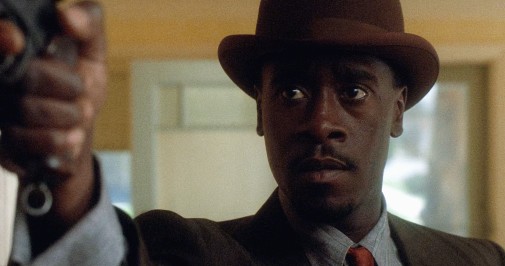
Noirvember can't end without a noir-themed write-up here at The Film Experience. It falls on the Almost There series to consider a style born in shadows, that cinema which came into its own in the aftermath of war and persists in perpetual reinvention. Though it'd be nice to look back on the origins of noir, most of the classics fell outside the Academy's radar. So it's only logical to wander into the depths of neo-noir, searching for a title that embodies the best of it all, combining classical sensibilities with a modern perspective. Thus, one arrives at Carl Franklin's Devil in a Blue Dress, a 1995 adaptation of Walter Mosley's book where a 1940s-set crime drama is reframed through the centering of a Black protagonist.
However, it wasn't the film's hardboiled anti-hero who caught the attention of awards voters. Instead, those honors befell on a supporting player – Don Cheadle in his breakout role as a dangerous man called Mouse…
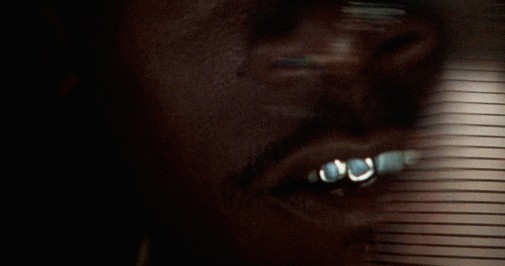
In 1948 Los Angeles, Ezekiel "Easy" Rawlins is one drop amid a sea of Black war veterans who must endure the malaise of postwar, as well as the limitations put upon him by a segregated society. When he finds himself out of work, recently laid off from Champion Aircraft, the need for cash forces him to pursue shady business. Through some connections, Easy's given the job of finding Daphne Monet, a white woman who's recently gone missing. The disappearance led her wealthy fiancé to drop off the mayoral race, adding a twist of political intrigue to the mystery. The pursuit takes Easy down to the depths of the Californian underbelly, where gangsters rule and the cops are just another brand of lawlessness.
Franklin makes some typical adaptation concessions, letting voice-over narration do a great deal of translating Mosley's story from the page to the screen. Thankfully, that mechanism is so commonplace within old-fashioned noir that it never feels forced by literary shackles. Indeed, the entire movie feels like a referential exercise, sidelining pastiche by means of its sincere cynicism, classicist form, and tonal rigor. The Angelino potboiler uses genre precepts to interrogate historically skewed perspectives, regarding the land of film noir through a racialized prism that makes old stories feel new again. After all, even 27 years later, the movie feels fresh though its conclusion – that the American Dream is a rotten lie – has been told to death already.
Denzel Washington's Easy is our entry point into this disillusioned world of Devil in a Blue Dress, but he is, by no means, the flick's most notable figure. Jennifer Beals makes for a haunting femme fatale in the role of the blue-clad Ms. Monet, while Don Cheadle steals the show whenever he's on-screen. Our first impression of his Mouse comes in quick flashes, memory disrupting present-day reflection in details that verge on abstraction. His voice echoes through the soundtrack, and then we get the sight of his mouth, a boyish grin slashed over gold teeth that glisten in the night. In some ways, director Carl Franklin is creating a sense of anticipation, feeding us morsels of this man until we get to taste the full bloom of his madness.
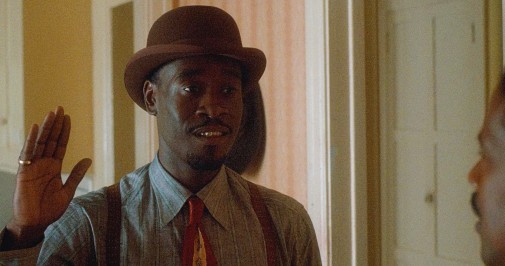
He walks into the narrative proper over halfway through when, after being threatened by racist thugs, Easy calls on his old friend from Houston to come provide some assistance, protection. In another flick, Mouse could have been a villainous character. Eminently homicidal, always carrying himself with disquieting malice, a short fuse, and trigger-happy fingers, he's the prototypical sidekick to the main antagonist, a menacing shadow looming over our hero. Only that, here, the racial lines drawn in the sand make him a necessary defense for Easy against a hateful system. He's a wannabee Angel of Death that almost functions as the benign reflection of Tom Sizemore's DeWitt Albright – the man who first hires Easy and the movie's most sinister presence.
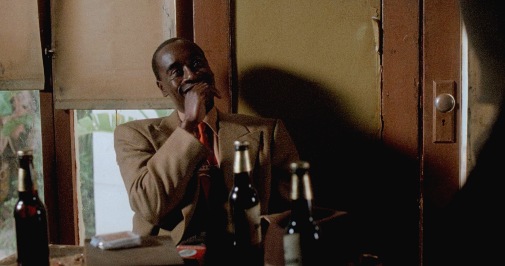
As an actor, Don Cheadle needs to negotiate the antithetical qualities of his livewire role, frightening the audience a smidge while also providing a nervous sort of comfort. Part of the alchemical solution to this challenge lies in the performer's sheer charisma, his ability to make merely existing in front of the camera feel like some electrifying thing. There's also a lot to praise about his calm nonchalance, approaching Mouse's most bloodthirsty actions with a flippant attitude that drips casualness. It's a nifty bit of characterization, making sure we understand Mouse's matter-of-fact relationship with violence while also making him weirdly entertaining.
The rodent-named, nattily-dressed man is also damn funny, sometimes giddy when watching over the film noir shenanigans before him. He's both amusing and deeply amused, cheering Easy from the sidelines with a gleeful attitude that feels incongruous with a drama where bodies pile on. That's not to say his performance is just an oscillation between malice and mirth. Cheadle makes Mouse a complex person, burdened by past pains that manifests late at night after much booze has been drunk and even a friend looks like a foe. He's dangerous and sad whilst being comical, a rueful rattlesnake with a clown nose.
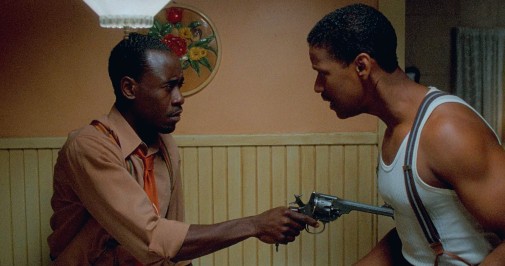
As the bloodshed escalates, Mouse might become more at ease, seemingly in his environment, but Cheadle continues to find variation in his portrait. One notices the watchfulness of Mouse, how he moves at the margins of scenes, stalking predator-like with calculation in those eyes. However, one notices a shred of doubt, hesitancy, perchance a reckoning with his own brutality. Such meditative notes make for a beautiful twist, culminating in a line reading for the ages – "If you ain't want him dead, why you leave him with me?" delivered in the style of an adolescent boy who firmly believes he did nothing wrong. Watching Washington and Cheadle play off each, whether in lighter scenes or these nocturnal nightmares, is a treat, maybe the best part of a film not lacking in other qualities.
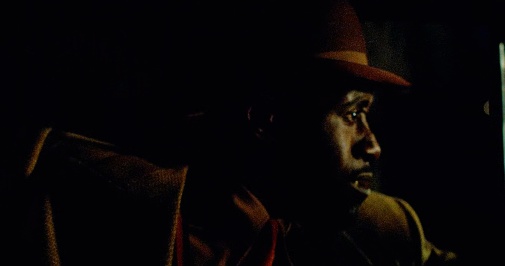
In the 1995/6 awards season, Don Cheadle scored significant support from both the industry and the critics. Right at the start of the race for gold, he won the LAFCA prize for Best Supporting Actor and went on to win the same honor from the NSFC. Moreover, he was nominated for a Screen Actor Guild Award. However, despite the acclaim, Devil in a Blue Dress was ultimately shut out by AMPAS, Cheadle included. That year, the Oscar nominees were James Cromwell in Babe, Ed Harris in Apollo 13, Brad Pitt in 12 Monkeys, Tim Roth in Rob Roy, and Kevin Spacey in The Usual Suspects. That last nominee won while Don Cheadle had to wait until 2004, whereupon he was nominated in Best Actor for his performance in Hotel Rwanda.
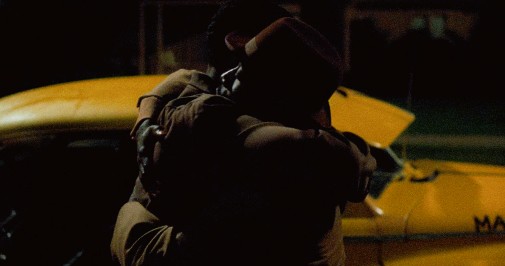
Devil in a Blue Dress is currently streaming on Hulu. You can also rent it from most of the major services.



Reader Comments (3)
You got him just right comforting but threatening at the same time,deserved a spot in one of the 90's weakest line ups.
I like the '95 supporting actor lineup. I would've liked it with Don Cheadle, too, but it's not a headscratcher year like 2011, where the majority don't belong there.
'95 Supporting Actor is such an odd duck line-up.
- Spacey in there for a Lead performance in a film they don't 100% embrace.
- Harris in there for a pretty quiet performance in an ensemble film.
- Cromwell best of the line-up with a performance in a children's movie.
- Pitt with a Big performance that's a bit unwieldy in a sci-fi movie they don't otherwise like.
- Roth as a moustache-twirling villain, lone representation from his movie.
None of them feel like especially normal nominees. Cheadle would've been a great inclusion, as would someone from Get Shorty (like Hackman or Lindo), or Rickman for Sense & Sensibility.